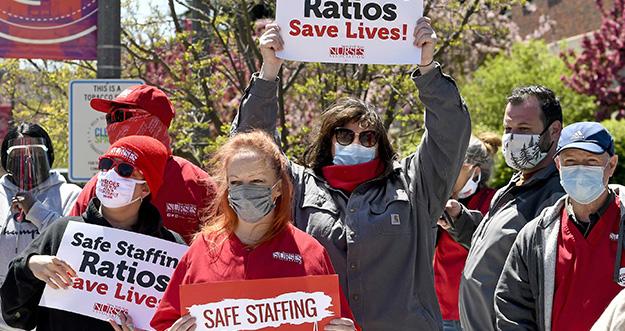The Legislature stands for safe staffing!

As the May Issue of New York Nurse goes to press, we are urging Governor Cuomo to sign the staffing bills described in this column and stand behind frontline healthcare workers, patients and nursing home residents so the laws can go into effect on January 1, 2022The New York State Legislature has listened and acted in behalf of nurses, healthcare workers and patients!
On May 4, a pair of landmark staffing bills passed in the State Senate by a unanimous vote, following a vote that passed in the State Assembly.
The laws are the result of a decade of advocacy by NYSNA nurses and healthcare professionals. This persistent advocacy on behalf of patients brought legislators to the table to begin making long-needed reforms.
Joined by other unions
NYSNA, CWA District 1 and 1199SEIU came together proposing solutions with state legislators and healthcare industry representatives regarding legislation that empowers all direct care staff in the determination of staffing levels and establishes a statewide, publicly reported enforcement mechanism when staffing standards are not met.
For the first time, a legal mandate is in place to set and enforce staffing standards at every hospital and nursing home in New York—regardless of whether the facility is public or private, not-for-profit or for-profit, union or non-union.
For hospitals, the Hospital Clinical Staffing Committees bill (A108B/S1168A) will usher in fundamental change. For one, the law calls for the establishment of clinical staffing committees, comprised of at least 50% frontline nurses and direct care staff to set annual staffing standards for each unit of a facility. Standards must be expressed in ratios or grids that meet or exceed those set in existing union contracts. Plans must consider census, acuity, skill mix, professional standards of care, and coverage of breaks and benefit time.
These staffing plans are enforceable by the NYS Department of Health, with civil penalties against hospitals that fail to create standards or abide by them. This makes NYSNA-negotiated staffing provisions state law.
Special recognition belongs to Assembly Member Aileen Gunther and Senator Gustavo Rivera regarding their leadership in sponsoring these bills.
Intensive Care Units
Up first, a requirement that NYS Department of Health is to establish new minimum staffing standards for ICUs and critical care units that must be incorporated in each hospital’s annual staffing plan. Actual staffing data, unresolved complaints and violations of the staffing plans will be publicly reported.
An independent commission will ultimately study the effectiveness of the new law in improving patient care and nurse staffing levels and make recommendations for further action by the Legislature.
The second law, A7119/S6346, applies to nursing homes, setting minimum nursing home staffing levels. It does so by requiring all nursing homes to meet minimum staffing levels set at 3.5 hours-per-resident day. These include standards for CNAs, NAs, RNs and LPNs.
The nursing home law requires at least 2.2 hours of care by certified nursing aides for each resident and at least 1.1 hours of care by RNs and LPNs.
Strong staffing committees
What’s most immediate for NYSNA? Members will organize and strengthen staffing committees in each facility, enforcing safe staffing standards and monitoring progress.
Taken together, the laws will give nurses the tools needed to advocate for patients and bring more accountability and transparency to the healthcare system.
NYSNA is committed to use this law to push for equitable, universal minimum safe staffing standards for all hospitals and nursing homes—regardless of zip code.
Patients, nursing home residents, and their loved ones need to know they can come to any hospital or nursing home in the state and receive safe, quality care with enough health-care workers to do the job. Safe staffing will truly save lives. I want to thank all the nurses who fought so long and so hard for these bills.” — Bill sponsor and Chair of the Assembly Mental Health Committee, Assembly Member Aileen Gunther
“The COVID-19 pandemic has exposed extensive flaws in our adult care facilities. Unfortunately, we have seen that an understaffed nursing home is a dangerous environment that can lead to harm and injury to residents. Families put their trust in these facilities to provide their loved ones with high quality care, treatment, and compassion. These New Yorkers deserve safe and appropriate levels of staffing, and my bill will do so by continuing to improve the way we serve our elder community. I thank Senate Majority Leader Andrea Stewart-Cousins for her leadership in advancing these critical bills.” — Bill sponsor and Chair of the Senate Health Committee, Senator Gustavo Rivera
“The pandemic has revealed just how critical it is to have proper and adequate staffing in nursing homes and hospitals. Without safe levels of staff, patients and residents are put at a greater risk of neglect, health complications, and an overall reduced quality in service. Understaffing not only has negative consequences for residents, but for employees as well, who can become extremely overworked and stressed. By adopting these requirements and establishing staffing plans, we’re ensuring that nursing homes and hospitals invest in the internal structures they need to provide the care they promise to residents and their families. This legislation will put these facilities on the path to better quality of life for patients, residents, and staff.” — Senate Deputy Leader Andrew Gounardes
“As legislators, we must support our nurses and healthcare workers who continue to work tirelessly to save lives. A year into this pandemic, It’s only right that our state finally mandates that healthcare facilities hire enough staff to properly care for their patients. When it comes to nursing homes, that means setting benchmarks for care. For hospitals, it means giving clinical workers a say in the staffing plans. The bottom line is that all New Yorkers deserve safe, quality healthcare. My thanks to Senator Gustavo Rivera for his excellent work as our health chair and to all the advocates who helped get these bills across the finish line.” — Senator Robert Jackson